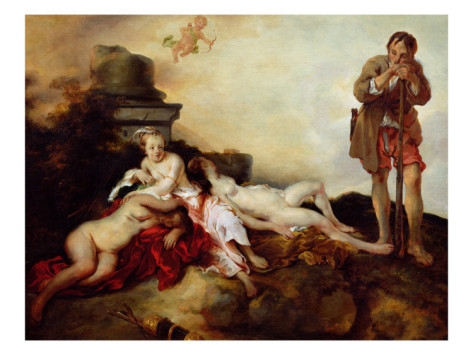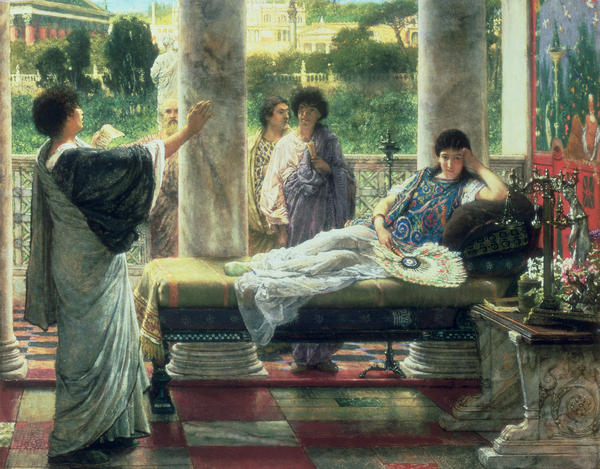La forza di natura, the force of nature will always prevail. Comedy is always the triumph of instinct over intellect. By whatever name, instinct is not only a will to live, but to produce life; comedy is essentially erotic…
And finally, the Happy Ending. What we have distinguished as the essential feature of comedy is strongly related to what has been called “elemental laughter,” i.e., that of a newborn child. As early as Darwin, scientists have observed that a baby’s first laugh is likely to occur when, after a brief separation from their mother, they see her return. Thus the elemental laugh is related to the elemental happy ending: the reunion of the family, as in the Odyssean archetype developed from Homer.

—Cimon and Iphigenia, from ‘The Decameron’ by Boccaccio (oil on canvas)
Title:
Noordt, Jan or Joan van (fl.1644-76)
Primary creator:
Dutch
Nationality:
Musee d’Art Thomas Henry, Cherbourg, France
Location:
Giraudon
Credit:
oil on canvas—Read More:http://www.bridgemanart.com/asset/220061/Noordt-Jan-or-Joan-van-fl.1644-76/Cimon-and-Iphigenia-from-%27The-Decameron%27-by-Bocca?
There appears to be a curious human need for this kind of simple resolution. Aristotle saw the happy ending not merely as pleasure for the audience, but one for which the collectively longed. Perhaps it is here appropriate to recall Freud’s observation that the essential comic pleasure lies in the temporary re-creation of the psychic state of childhood.
There is a short poem by Catullus that beautifully expresses this basic but complex delight. The poet has been journeying in far-off places and finally returns to his native village. Catullus hails the region and its lake in loving and erotic terms. After the anxieties of separation, he can now rest on the bed he dreamed of:
O what is more glorious than when, with
cares unwinded, the mind sets down its
baggage, and worn out from the efforts of
travel, we come to our home and rest
softly on our longed-for bed?

—Catullus Reading his Poems Painting – Catullus Reading his Poems Fine Art Print – Sir Lawrence Alma Tadema—Read More:http://fineartamerica.com/featured/catullus-reading-his-poems-sir-lawrence-alma-tadema.html
This vision, at once infantile and erotic, promises the twofold satisfaction that “homecoming” evokes in our imagination. It contains also the essence of comedy’s happy ending. And see how Catullus in the final line asks to be welcomed by his beloved home: “Laugh out all the joyous laughter in the house!”
Comedy, then, is an odyssey from estrangement abroad to reunion at home. And the happiest of all possible endings is…laughter in the house.







 COMMENTS
COMMENTS



